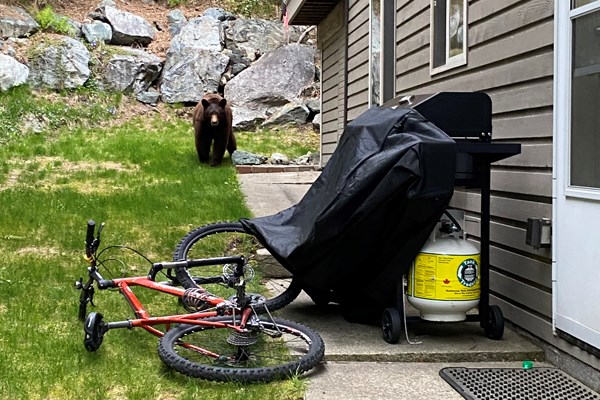It finally happened.
For five years I’ve had a barbecue next to the door of my Whistler Cay suite, and for five years I’ve worried about a bear getting into it.
I’ve always been diligent about removing the grease trap, and keeping it as clean as possible, and they’ve always been ambivalent towards it.
The small patch of green space beside my house is a semi-frequent corridor for wandering bears young and old, but in all the years I’ve lived there, they’ve always just passed through, never bothered by the presumably tantalizing, greasy barbecue sitting by the door.
And so complacency set in.
Until last week, when I returned home to find a curious, teenaged bear in the process of pulling off my barbecue cover.
I would later discover I had forgotten to remove the grease trap from underneath the barbecue, something I’m always very careful to do for this exact reason.
After a brief, shock-induced pause, I laid into the horn and shouted obscenities in the bear’s direction, which didn’t seem to mean much to him.
He looked at me, but the subtler intricacies of my colourful language seemed lost on him.
“Honking the horn in Whistler, it’s unlikely to do anything, just because they’re super habituated in Whistler,” said Sylvia Dolson, the former longtime Whistler bear advocate who now resides on the Sunshine Coast, when I called her for advice.
“There are areas where they would still be leery of a horn and take off, but in order to develop any kind of feeding strategy at all in Whistler they have to ignore a lot of stuff, and so they ignore horns, and if you’re yelling at them from inside the vehicle, probably not helpful either.”
When my honking failed, I moved to improvised strategy No. 2: rocks. Scooping up a handful of small stones from the driveway, I advanced on the bear.
When I tossed one in his direction (along with more choice obscenities) he started to get the hint and made a hasty retreat to the corner of the property, where he turned around again to gauge my next move. We locked eyes in a classic Whistler standoff, neither sure of what would come next—a physical, literal representation of man v. nature, playing itself out in my backyard.
“This is a constant negotiation with a bear, so they’re constantly saying, ‘do I have to step it up a little to get what I want? Or are they damn serious about what they want?’” Dolson said with a laugh.
“So it’s this back and forth, back and forth.”
This being my first bear negotiation, I found myself at a bit of a loss at this point—what happens if he bluff-charges? I’m sure I could take him one-on-one in a fight, but what would the neighbours think?
I knew I couldn’t concede the barbecue, which was still clearly his objective. So I went back to a tried-and-tested strategy, and threw more rocks, which sent the young bear scampering off the property.
While my first instinct in the aftermath of the experience was shame—why didn’t I do more to protect this bear?—the timing of the encounter may have been fortuitous, Dolson explained.
While bear encounters in residential neighbourhoods should be reported to the COS, the reality is conservation officers often can’t respond in time to teach the bear the proper lesson.
“The animal has to have a negative consequence immediately, preferably within two seconds of the behaviour. That’s how mammalian behaviour works,” Dolson said.
“Hopefully [the lesson] did stick, but the thing is, in Whistler, there’s 99 other sources for the one that you just deterred him from, right? … If he was a young teenage boy, they’re like any young teenage boy, they’re going to take a little more, they’re going to test their limits more than any other age, class and sex.”
As for why my barbecue became a target this year of all years, it was probably only a matter of time, Dolson added.
“I could repeat that story a thousand times, people calling me and saying that same thing: ‘I’ve been here 20 years and this has never happened to me,’” she said.
“But eventually it does.”
Lesson learned, and there will be no more complacency from me when it comes to bear attractants.
With the colder spring weather seen in the Whistler Valley so far this year, bears are looking further and wider for food sources—which can naturally lead them into neighbourhoods and poorly managed attractants.
“Our Environmental Stewardship department has noted that more bears are being observed lower in the valley at this time, likely looking for food due to the amount of snow up high. They have seen some healthy bears and cubs, but also saw one unhealthy sow with two cubs (thought to be underweight due to lack of food which could be from last fall, this spring or during both periods),” said a Resort Municipality of Whistler spokesperson, in an email.
According to the Conservation Officer Service, there were 85 reports related to black bears in Whistler from March to May.
“It has definitely been a busier start to the bear season,” said COS officer Brittany Mueller, in an email.
There have been no bears killed due to conflict, and no relocations aside from two cubs to Critter Care earlier in May, Mueller added.
Other key messages from the COS: ensure all attractants are properly secured, including garbage, recycling, bird feeders, pet food, citronella candles and petroleum; keep dogs on leash, and give bears space (100 metres, or seven school buses); carry bear spray and know how to use it; and report bear sightings by phoning 1-877-952-7277.
“Early reporting allows the COS to assess situations and help keep people safe from wildlife conflict and our bears safe and wild,” Mueller said.
Find more tips, info and resources at whistler.ca/bears.




